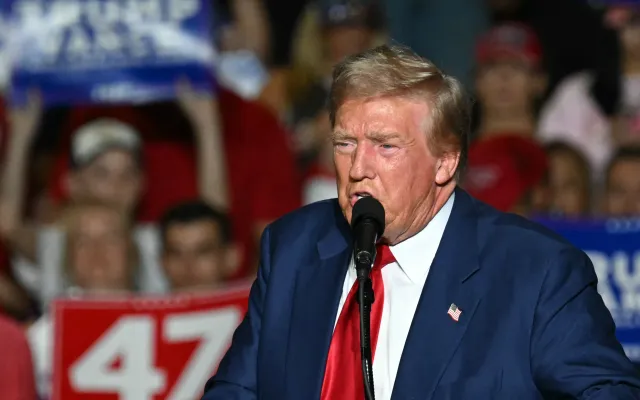In a surprising turn of events, Donald Trump’s recent debate performance has ignited a firestorm of discussion across social media platforms. Many are drawing comparisons between his responses in the 2016 debates and those he delivered this week, particularly regarding immigration—a topic he has historically championed. However, this time, his answers seemed disjointed and off-topic, leaving viewers and analysts alike scratching their heads.

During the debate, Trump launched into a lengthy critique of his opponent, Kamala Harris, but quickly veered off course. He began discussing amnesty for immigrants, labeling it a disaster and unfair to those who have been waiting in line for years. “We need strong borders,” he declared, emphasizing the need for a wall and claiming that drugs are “pouring in” across the southern border. However, his argument took a bizarre turn when he claimed that immigrants were “eating the dogs and cats” of local residents in Springfield, Ohio. This peculiar assertion left many bewildered, as it seemed to lack any factual basis.
Legal analyst Michael Popok highlighted that Trump’s mental decline was evident when comparing his debate responses from 2016 to now. He noted that Trump’s reliance on far-right influencers, particularly Laura Loomer, has significantly shaped his campaign strategy. Loomer, a controversial figure known for her extreme views, has become increasingly influential within Trump’s inner circle, even participating in his debate preparation. Her presence raises questions about the direction Trump’s campaign is taking, especially as she is often viewed as too radical, even by some in the MAGA movement.
In the aftermath of the debate, Trump’s decision to bring up topics like pets being eaten by immigrants was met with confusion. Critics argue that this reflects a lack of coherent policy ideas and a reliance on sensationalism rather than substantive discussion. The fact that Loomer was reportedly by his side during the debate underscores the troubling influence she wields over Trump’s messaging.
The Trump campaign’s social media strategy also came under scrutiny. Reports indicate that they established a “war room” to manage real-time reactions during the debate, staffed by figures known for promoting conspiracy theories and misinformation. This includes individuals like the head of the controversial “Libs of TikTok” account and other right-wing podcasters. Critics argue that this approach is indicative of a campaign that is out of touch with mainstream American values and concerns.
Polling data following the debate revealed that a significant majority of viewers believed Kamala Harris performed better. Surveys indicated that at least 70% of respondents felt Harris won the debate, including 30% of self-identified Republicans. This suggests that Trump’s strategy may have backfired, further alienating moderate voters and solidifying Harris’s position as a formidable candidate.
The implications of Trump’s performance extend beyond just one debate. Observers are concerned that his reliance on fringe figures like Loomer could further erode his support among traditional Republican voters. As the election approaches, many are questioning whether Trump can regain his footing or if he is destined to repeat the mistakes of his past.
In conclusion, Trump’s recent debate performance and the subsequent fallout have left many divided on social media. While some supporters remain steadfast, others express concern about the direction of his campaign and the influence of far-right extremists. As discussions continue to unfold, it remains to be seen how these developments will impact Trump’s chances in the upcoming election. The political landscape is shifting, and the stakes have never been higher.





